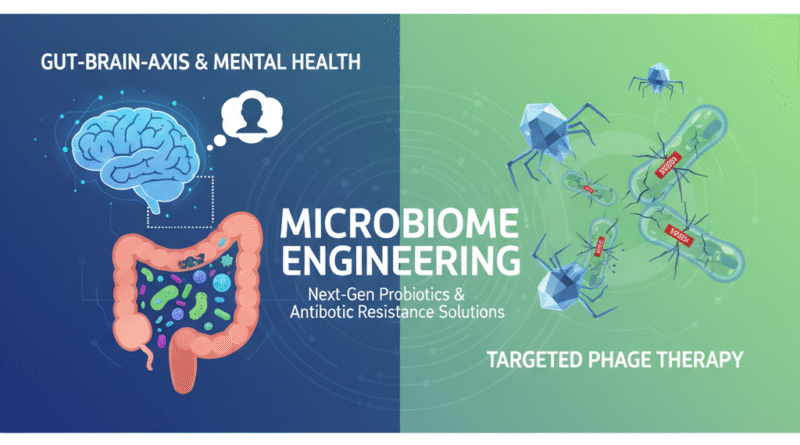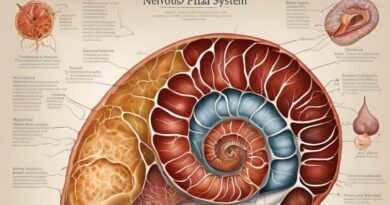Microbiome Engineering
Title: Microbiome Engineering: The Gut-Brain Axis, Mental Health, and Targeted Phage Therapy
Introduction: The Microbiome Revolution
Over the past decade, scientists have uncovered a fascinating truth our health is deeply connected to the trillions of microbes living inside our bodies. This community, known as the human microbiome, influences everything from digestion and immunity to even how we think and feel. Moreover, research in microbiome engineering has opened new doors to understanding how gut bacteria affect our brain and mental health.
In addition, scientists are now exploring how bacteriophages, viruses that infect bacteria could become a powerful solution to antibiotic resistance. Therefore, microbiome engineering is quickly becoming one of the most promising fields in modern biotechnology, combining biology, genetics, and neuroscience to create smarter, more targeted therapies.
The Gut-Brain Axis: How Your Microbes Talk to Your Mind
The gut-brain axis refers to the two-way communication between your gut microbiota and your brain. This connection means that what happens in your gut doesn’t stay there, it can directly influence your mood, behavior, and even cognitive function.
For example, certain gut bacteria produce neurotransmitters like serotonin and dopamine, which are key regulators of mood and emotion. Moreover, studies show that people with anxiety, depression, or autism spectrum disorders often have imbalanced gut microbiota. As a result, restoring this balance through microbiome-based interventions could support better mental health.
In addition, gut bacteria interact with the immune system, influencing inflammation in the brain. Therefore, a healthy gut may help prevent chronic inflammation linked to depression and neurodegenerative diseases.
Next-Generation Probiotics: Engineering for Mental Health
Traditional probiotics, like those found in yogurt, can improve digestion and immunity. However, next-generation probiotics go a step further. They are designed using microbiome engineering to target specific pathways related to brain and mental health.
For instance, researchers are developing engineered Lactobacillus and Bifidobacterium strains that can produce higher levels of beneficial molecules such as gamma-aminobutyric acid (GABA), which calms the nervous system. Moreover, these engineered probiotics could help treat depression, anxiety, or even sleep disorders naturally.
In addition, scientists are exploring fecal microbiota transplants (FMTs), it is a process where beneficial gut microbes from a healthy person are introduced into another person’s gut. Therefore, this therapy aims to reset the gut ecosystem, potentially improving mood, cognitive performance, and overall well-being.
The Science Behind Microbiome Engineering
Microbiome engineering involves manipulating microbial communities to achieve specific health outcomes. Researchers use tools like CRISPR-Cas9 gene editing to modify bacterial genes, making them produce helpful compounds or eliminate harmful ones.
Moreover, bioengineers use computational models to predict how engineered microbes will interact with existing gut flora. As a result, therapies become safer, more precise, and longer-lasting. In addition, this approach helps avoid the side effects commonly associated with chemical drugs.
Therefore, by understanding and redesigning our microbiome, scientists can create customized solutions for conditions ranging from obesity and diabetes to anxiety and Alzheimer’s disease.
Targeted Phage Therapy: A New Weapon Against Superbugs
While the gut-brain connection attracts much attention, another critical challenge is the rise of antibiotic-resistant bacteria. These “superbugs” have made many antibiotics ineffective. However, targeted phage therapy offers hope.

Bacteriophages, or phages for short, are viruses that infect and kill specific bacteria. Unlike antibiotics, which can harm both good and bad bacteria, phages are highly selective. Moreover, when engineered with CRISPR technology, they can precisely destroy antibiotic-resistant genes within harmful bacteria.
In addition, phages evolve alongside bacteria, which means they can adapt and remain effective where antibiotics fail. As a result, phage therapy could revolutionize how we treat infections especially those in the gut and bloodstream.
CRISPR-Enhanced Phages: Precision Medicine in Action
The combination of phage therapy and CRISPR is one of the most exciting developments in microbiome engineering. Researchers can now program phages to carry genetic scissors that cut specific DNA sequences in bacterial genomes. Therefore, they can deactivate resistance genes or virulence factors without harming beneficial microbes.
Moreover, this precision makes CRISPR-enhanced phages a potential game-changer in treating chronic infections and restoring a healthy microbiome. In addition, this technology could be used to fine-tune microbial communities in the gut, enhancing mental health and immune response simultaneously.
The Future of Microbiome-Based Medicine
The future of microbiome engineering looks bright. Scientists envision a world where we can diagnose mental or physical disorders by analyzing gut bacteria and then prescribe personalized probiotics or phage therapies to restore balance.
Moreover, advances in AI and bioinformatics will make it easier to map individual microbiomes and design tailored treatments. As a result, the concept of “one-size-fits-all medicine” may soon disappear. Instead, treatments will be more targeted, effective, and side-effect-free.
In addition, public awareness about gut health is growing, encouraging better dietary habits and lifestyle choices that support a thriving microbiome.
Conclusion: Reimagining Health Through Microbes
In conclusion, microbiome engineering stands at the cutting edge of biotechnology and medicine. From understanding the gut-brain axis to developing next-generation probiotics and CRISPR-based phage therapies, this field is redefining how we think about health.
Moreover, as research continues, the microbiome could become a key to unlocking solutions for mental health, immunity, and antibiotic resistance. Therefore, nurturing and engineering our microbial allies might be the smartest investment in the future of global health.




